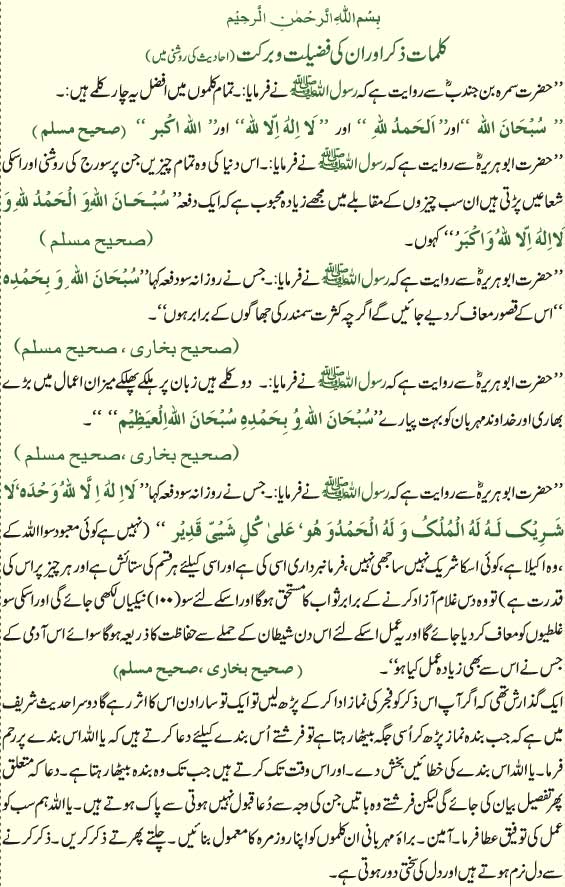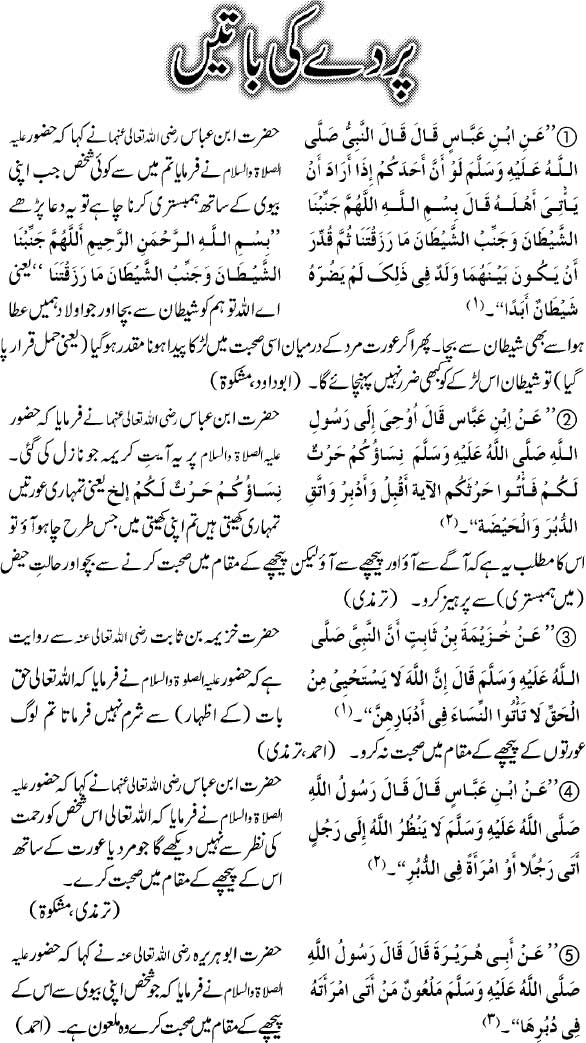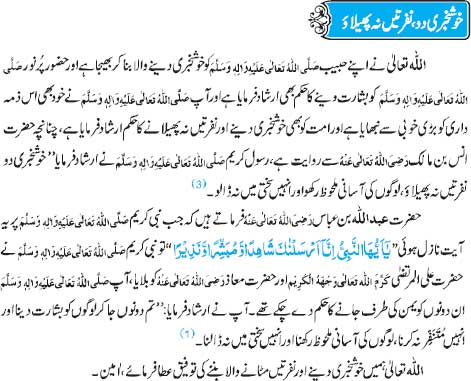
Why Is Secularism Incompatible With Islam?
Secularism can never enjoy a general acceptance in an Islamic society. For Muslim societies, the acceptance of secularism means something totally different. As Islam is a comprehensive system of worship (Ibadah) and legislation (Shari’ah), the acceptance of secularism means abandonment of Shari’ah, a denial of the divine guidance, and a rejection of Allah’s injunctions. It is indeed a false claim that Shari’ah is not proper to the requirements of the present age. The acceptance of a legislation formulated by humans means a preference of the humans’ limited knowledge and experiences to the divine guidance: “Say! Do you know better than Allah?” (Qur’an, 2:140)
For this reason, the call for secularism among Muslims is atheism and a rejection of Islam. Its acceptance as a basis for rule in place of Shari’ah is downright apostasy. The silence of the masses in the Muslim world about this deviation has been a major transgression and a clear-cut instance of disobedience which have produced a sense of guilt, remorse, and inward resentment, all of which have generated discontent, insecurity, and hatred among committed Muslims because such deviation lacks legality.
Secularism is (only) compatible with the Western concept of God which maintains that after God had created the world, He left it to look after itself. In this sense, God’s relationship with the world is like that of a watchmaker with a watch: he makes it then leaves it to function without any need for him. This (baseless) concept is inherited from Greek philosophy, especially that of Aristotle who argued that God neither controls nor knows anything about this world.
This concept is totally different from that of Muslims. We Muslims believe that Allah is the sole Creator and Sustainer of the Worlds. One Who “…takes account of every single thing.” (Qur’an, 72:28); that He is All-Powerful and All-Knowing; that His Mercy and Bounties encompass everyone and suffice for all. In that capacity, Allah revealed His divine guidance to humanity, made certain things permissible and others prohibited, commanded people to observe His injunctions and to judge according to them. If they do not do so, then they commit Kufr, aggression, and transgression.
-By By Yusuf Al-Qaradawi
Kalmat E Zikr: Fazeelat Aur Barkat

Knowing The Bounds Of Our Mannerisms
Mannerisms have limits: When these limits are crossed, they become transgression. When they fall short, they become deficiency and disgrace.
Anger has a limit: It is to be bold while being above having negative and deficient traits, and this is the perfect form of anger. If this limit is exceeded, you become a transgressor. If you fall short of it, you will be a coward and will not be able to raise yourself above negative traits.
Covetousness has a limit: It is to take all you need from this world and what it has to offer you. When you fall short of this limit, it becomes disgrace and lack of resolve. When you exceed this limit, you end up wanting what you shouldn’t want.
Envy has a limit: It is to compete in becoming perfect and to excel such that your rival is unable to excel you. When this limit is exceeded, you transgress and oppress in which you wish that the good things are taken away from the one you envy and are keen to harm him. When you fall short of this limit, you become low, weak in aspiration, and you belittle yourself. The Prophet (peace be upon him) said: “There should be no envy except in regards to two things: a man who is granted wealth by Allah and he is able to spend it for the sake of the truth, and a man who is granted wisdom by Allah and he takes it and teaches it to the people.” So, this is an envy of competition, where the envious one pushes himself to be like the one he envies without wishing that he is deprived of the good things that he has.
Sexual desire has a limit: It is to relax the heart and mind from the exhaustion of worship, to maintain moral excellence, and to use the fulfillment of these desires to help you in this. When you exceed this limit, you fall into being overly lustful, and you come to resemble animals. When you fall short of this limit and don’t use this time to obtain excellence and virtue, this becomes weakness, inability, and disgrace.
Relaxation has a limit: It is to collect yourself and your strength to prepare for worship and perfection of the self and to save this so that you don’t become weak or tired. When you exceed this limit, this becomes laziness and waste, and you end up missing out on so many things that could benefit you. When you fall short of this limit, you end up hurting and weakening your energy, and it might even be cut off from you like a farmer who has no land to plow or crops to pick.
Generosity has a limit: Whenever this limit is exceeded, this becomes wastefulness and extravagance. When you fall short of this limit, you become cheap and miserly.
Bravery has a limit: When you cross this limit, you become reckless. When you fall short of this limit, you become a coward. This limit is that you put yourself forth when the time is right to do so and that you hold yourself back when the time is right to do so, just like Mu’awiyah said to Amr Bin Al-’Aas: “I don’t know whether you’re brave or cowardly! You go forth to the point that I say you’re the bravest person, and then you stay back to the point that I say you’re the most cowardly person!” So, he replied: “I am brave if I am guaranteed the chance, If I don’t have the chance, I am a coward.”
Protective jealousy has a limit: If you exceed this limit, you fall into accusation and suspicion of the innocent. If you fall short of this limit, you fall into heedlessness and lack of manhood.
Humility has a limit: If it is crossed, this becomes humiliation and disgrace. If you fall short of it, you deviate from arrogance and false pride.
Honor has a limit: If you exceed it, you fall into arrogance and blameworthy traits. If you fall short of it, you deviate to humiliation and disgrace.
The basic principle in all this is to choose the path of moderation between excess and negligence. This is what all of the benefits of this world and the next are built upon. In fact, you can benefit your body in no other way, because when some of your activities are done with a lack of moderation and either exceed or fall short of it, your body’s health and energy begin to decline accordingly.
Likewise, natural activities such as sleeping, staying awake, eating, drinking, having intercourse, playing sports, spending time alone, spending time with others, etc. – if these are all done moderately between the two blameworthy extremes, this is justice. If you deviate to either extreme, this is a sign of deficiency and will lead to even more deficiency. This knowledge of proper limits is from the best types of knowledge, especially the limits of what is commanded and prohibited. The most knowledgeable people are those who know the most about these limits.
– By Ibn Qayyim Al-Jawziyyah, Al-Fawa’id, pg. 196-199
Namoos Kay Mani

Mufti Muneebur Rehman
Miscellaneous Excerpts From The Holy Qur’an
[1:1] In the name of GOD, Most Gracious, Most Merciful
[3:14] Adorned for the people are the worldly pleasures, such as the women, having children, piles upon piles of gold and silver, trained horses, livestock, and crops. These are the materials of this world. A far better abode is reserved at GOD.
[4:86] When greeted with a greeting, you shall respond with a better greeting or at least an equal one. GOD reckons all things.
[5:50] Is it the law of the days of ignorance that they seek to uphold? Whose law is better than GOD’s for those who have attained certainty?
[6:70] You shall disregard those who take their religion in vain, as if it is a social function, and are totally absorbed in this worldly life. Remind with this (Quran), lest a soul may suffer the consequences of its evil earnings. It has none besides GOD as a Lord and Master, nor an intercessor. If it could offer any kind of ransom, it would not be accepted. They suffer the consequences of the evil works they earn; they have incurred hellish drinks, and a painful retribution because of their disbelief.
[21:16] We did not create the heavens and the earth, and everything between them just for amusement.
[21:17] If we needed amusement, we could have initiated it without any of this, if that is what we wanted to do.
[28:85] Surely, the One who decreed the Quran for you will summon you to a predetermined appointment. Say, “My Lord is fully aware of those who uphold the guidance, and those who have gone astray.”
[29:64] This worldly life is no more than vanity and play, while the abode of the Hereafter is the real-life, if they only knew.
[31:6] Among the people, there are those who uphold baseless Hadith, and thus divert others from the path of GOD without knowledge, and take it in vain. These have incurred a shameful retribution.
[42:21] They follow idols who decree for them religious laws never authorized by GOD. If it were not for the predetermined decision, they would have been judged immediately. Indeed, the transgressors have incurred a painful retribution
Mian Biwi Ke Taluqat: Parday Ki Baatein

The Most Exclusive Blessings Is Ramadan From Allah
Sahl Ibn Sa’d radi Allahu anhu narrates that RasulAllah sal Allaahu alayhi wa sallam said: “In Jannah, there is a gate called Ar-Rayyan: a door which the Saa’imoon will enter from, no one else except them. It will be announced, ‘Where are the Saa’imoon?’ and the Saa’imoon will stand. No one except them will enter from the gate called Rayyan.”
Have you ever heard of a weekend warrior? They are employees who sit in cubicles and relax at a coffee station, weighed down with donuts all week long. Then on the weekend, they rip off their suits bearing their Reebok gear underneath and spend the entire weekend playing basketball, hang gliding, and mountain climbing. What happens? They break their knees, pull a dozen muscles, and are hospitalized on Monday.
This is in relation to the physical body. But there are people that should be known as Ramadan warriors. They are those that haven’t fasted all year long and then shock their bodies with a whole month. Or haven’t prayed in the masjid or haven’t woken up to pray in the night all year long. What happens to them? As one Muslim doctor said, “In normal days, we have about 5 to 7 patients a day. On the first day of Ramadan, the patients increase to over 50!”
Ramadan warriors were rare in our Islamic history. To illustrate, let’s all remember where we were at the beginning of Safar. We were probably praying for work to end, or just finished up with exams, or looking through brochures for a holiday getaway.
Interestingly, if we were sitting beside a Tabi’oon over a thousand years ago in a simple masjid, we would have heard him raising his hands asking Allah to grant him the blessing of being around when a guest comes, a guest called Ramadan!
There are different ways that we can ‘warm up’ for Ramadan. One of those ways is by increasing the frequency of our du’a. Allah subhaanahu wa ta’aala says in the Qur’an, with the verse before it talking about Ramadan and the verse after it speaking about Ramadan, and right in the middle we read:
And when My servants ask you, (O Muhammad), concerning Me – indeed I am near. I respond to the invocation of the supplicant when he calls upon Me. So let them respond to Me (by obedience) and believe in Me that they may be guided (Al-Baqarah 2/186).
Every goodness on earth is from Allah. And one of the most exclusive blessings is Ramadan. So let us ask the Lord of Ramadan to help us find His mercy in the coming days.
The early generations of the ummah used to make du’a 6 months after Ramadan that Allah accept their deeds in Ramadan. And for the next 6 months, they would make du’a to Allah to grant them the blessing of being alive in the coming Ramadan.
Cleanliness – Whenever a guest comes, we prepare in advance for his arrival by vacuuming the carpet, dusting the shelves, and scrubbing the sinks. We should do this for our guest called Ramadan. But the scrubbing should not just be of our physical surroundings; it should include the scrubbing of our sins.
Listen to the words of RasulAllah sal Allaahu alayhi wa sallam speaking about those people that don’t want to clean up for Ramadan:
“Whoever doesn’t desist from speaking falsehood and acting upon it, Allah has no need that he desist from his food and drink” (Bukhari).
Fasting in Sha’baan (the month before Ramadan) – The biggest downfall of the weekend warriors was that they were not properly warmed up for the exercise, which caused the injuries. Similarly, when fasting, some people only do it once a year, making their bodies very foreign to going without food and drink.
From here we see the following Sunnah: Umm Al-Mu’mineen Aisha radi Allahu anha observes, “Allah’s Messenger never fasted an entire month other than Ramadan and I haven’t seen him fast more than he did in Sha’baan.”
When we look at the celebrations of ‘the holy days’, we see that they put all their time and effort, and spirit into preparation. I tell you, go to any store outside this masjid and you will see preparations of candy canes, red and green bouquets, even eggnog all in the wait for the annual celebration of the birth – as they falsely claim- of Prophet ‘Eesa alayhis salaam. They are preparing for their falsehood almost 2 months in advance! One of the ways to prepare for Ramadan is to educate ourselves in the Fiqh of Ramadan. Alhamdulillah, sitting in this masjid today are many brothers and sisters for whom this will be their first Ramadan. Allahu Akbar! May Allah accept it from them and allow them and us to share in the blessing of Ramadan for many years to come.
Let us briefly review what fasting is:
Fasting in Ramadan is not optional – it is a must. The evidence for this is found in the Qur’an and Sunnah. Allah says:
O you who believe! Observing as-sawn (the fasting) is prescribed for you as it was prescribed for those before you, that you may become al-muttaqoon (the righteous) (Al-Baqarah 2/183).
The Prophet said: “Islam is built on five (pillars)…” among which he mentioned fasting in Ramadan (Bukhari).
The Arabic word for fasting is sawm. In Arabic, it literally means to abstain from something. And in Islamic Law, it is to abstain from those things that break the fast starting from dawn (Fajr prayer) and ending with sunset (Maghrib prayer) having first made the intention to do so.
The things which break one’s fast, the things which he or she must abstain from, from dawn to sunset, are as follows: eating and drinking, and marital relations.
These apply if 3 conditions are met: that the person is not ignorant that this thing breaks one’s fast, that he is aware that he is doing something that breaks his fast (meaning he did not do so in forgetfulness), and he does so out of his free will and no one forced him to break his fast.
In conclusion, as the month of Ramadan draws nearer, we should prepare for this special guest by preparing a Ramadan program (‘Operation: Valuable Time’) in our homes and at our masajid. The program should include:
1. Locked times of the day when we will consistently recite the Qur’an, learning its meanings and memorizing new surahs.
2. Something useful for the time before Taraweeh prayers and the time after Taraweeh. And how to increase our worship in the last ten nights – i.e. what will we do extra.
3. We should make sure that there are days of this month when we feed people. Bring dates or milk to the masjid for Maghrib. Invite people over to have dinner with your family. Organize a dinner in the masjid and invite people that don’t normally get invited because they are new. Take care of the new Muslims in your community and for the sake of Allah ta’aala make their Ramadan special.
4. Make the intention to double and triple the amount of sadaqah we give, the worship we normally do, the dhikr we do, and the deeds that’ll help us purify our souls.
5. And finally, for those that can afford it, plan an Umrah to the Ka’bah in Ramadan!
After returning from the Farewell Hajj, RasulAllah sal Allaahu alayhi wa sallam saw an Ansari woman who had not made the Hajj. He asked her, “What kept you back from joining in the Hajj?”
She said, “We had a camel that we used to ride which Abu Fulan and his son went on, and another we used for farming.”
So, RasulAllah sal Allaahu alayhi wa sallam said, “Verily, Umrah in Ramadan is the same (reward) as performing Hajj with me” (Bukhari and Muslim)!
khushkhabri Do Nafratein Na Phelao

The Demise Of Fatimah Radhiyallahu Anha
Fatimah was the youngest daughter of the Prophet, peace, and blessings be upon him, and her mother was Khadijah Bint Khuwailid. Fatimah was born five years before prophethood, i.e. before Muhammad, peace, and blessings are upon him, was sent as Allah’s Prophet.
She was engaged to `Ali Ibn Abu Talib, may Allah be pleased with him, in the second year after Hijrah (the Prophet’s Migration to Madinah) in Ramadan, then they got married in Dhul Hijja. She gave birth to Al-Hasan, Al-Husain, Zainab, Umm Kulthum, and Muhsin who died when he was a child.
She was very dear to the Prophet, peace, and blessings be upon him. `A’ishah, may Allah be pleased with her, narrated: “Fatimah, may Allah be pleased with her, was coming towards our home, walking exactly like the Prophet, peace, and blessings be upon him. The Prophet said: ‘Welcome, my daughter!’ He seated her to his right or left. Then he told her something in secret, and she cried. I (`A’ishah) said to her: ‘The Prophet discloses his secrets to you and you cry, how come? Then the Prophet, peace, and blessings be upon him, told her another thing in secret and she laughed. Hence I (`A’ishah) said: ‘I’ve never seen a sad mood turning in a moment to happiness as I see today’. I asked her about what the Prophet told her, but she said: ‘I am not to reveal the secrets of Allah’s Messenger, peace and blessings be upon him.’
Later on, when the Prophet, peace, and blessings be upon him, passed away, I asked her again. She answered: He (the Prophet) told me: ‘Gabriel used to reveal the Qur’an to me once a year. Yet he did it twice this year. So I think it is a sign that my days are numbered, and you will be the first one of my folk who will die after me. What a good predecessor I am to you!’ Hence, I cried. Then he told me: ‘Doesn’t it gladden you to be the master of believing women in Paradise?’ Hence, I laughed.” This incident is agreed upon.
It is said that she never laughed after the Prophet’s demise out of overwhelming sadness and eagerness to follow her father, peace, and blessings be upon him.
Fatimah, may Allah be pleased with her, died on the third of Ramadan, the night of Tuesday, 11 A.H. May Allah be pleased with her.

